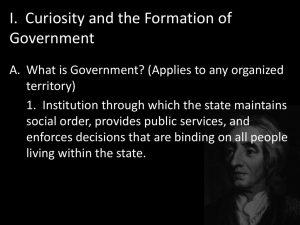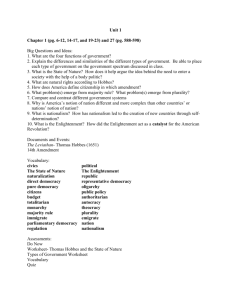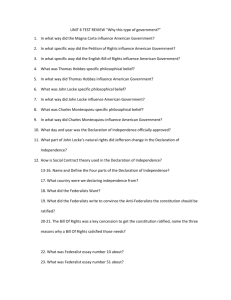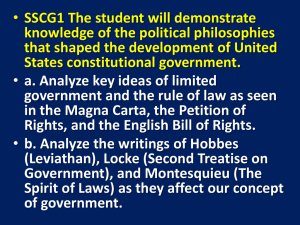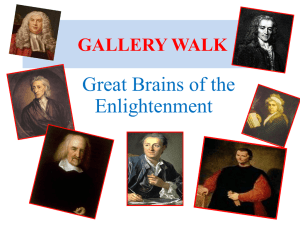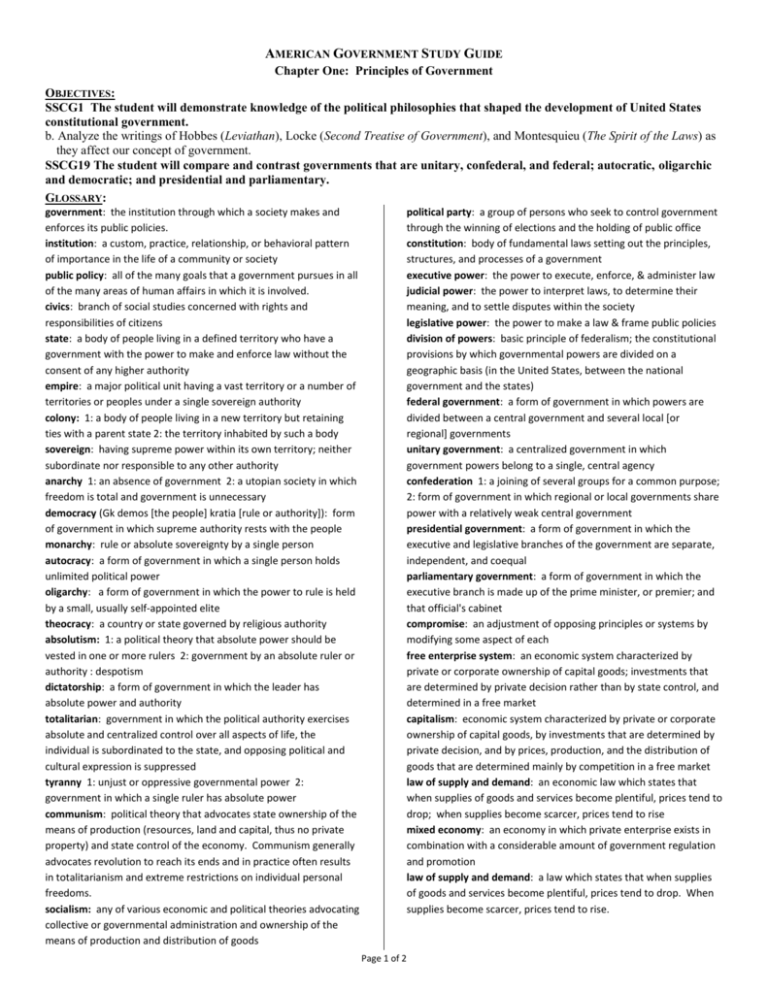
AMERICAN GOVERNMENT STUDY GUIDE
Chapter One: Principles of Government
OBJECTIVES:
SSCG1 The student will demonstrate knowledge of the political philosophies that shaped the development of United States
constitutional government.
b. Analyze the writings of Hobbes (Leviathan), Locke (Second Treatise of Government), and Montesquieu (The Spirit of the Laws) as
they affect our concept of government.
SSCG19 The student will compare and contrast governments that are unitary, confederal, and federal; autocratic, oligarchic
and democratic; and presidential and parliamentary.
GLOSSARY:
government: the institution through which a society makes and
enforces its public policies.
institution: a custom, practice, relationship, or behavioral pattern
of importance in the life of a community or society
public policy: all of the many goals that a government pursues in all
of the many areas of human affairs in which it is involved.
civics: branch of social studies concerned with rights and
responsibilities of citizens
state: a body of people living in a defined territory who have a
government with the power to make and enforce law without the
consent of any higher authority
empire: a major political unit having a vast territory or a number of
territories or peoples under a single sovereign authority
colony: 1: a body of people living in a new territory but retaining
ties with a parent state 2: the territory inhabited by such a body
sovereign: having supreme power within its own territory; neither
subordinate nor responsible to any other authority
anarchy 1: an absence of government 2: a utopian society in which
freedom is total and government is unnecessary
democracy (Gk demos [the people] kratia [rule or authority]): form
of government in which supreme authority rests with the people
monarchy: rule or absolute sovereignty by a single person
autocracy: a form of government in which a single person holds
unlimited political power
oligarchy: a form of government in which the power to rule is held
by a small, usually self-appointed elite
theocracy: a country or state governed by religious authority
absolutism: 1: a political theory that absolute power should be
vested in one or more rulers 2: government by an absolute ruler or
authority : despotism
dictatorship: a form of government in which the leader has
absolute power and authority
totalitarian: government in which the political authority exercises
absolute and centralized control over all aspects of life, the
individual is subordinated to the state, and opposing political and
cultural expression is suppressed
tyranny 1: unjust or oppressive governmental power 2:
government in which a single ruler has absolute power
communism: political theory that advocates state ownership of the
means of production (resources, land and capital, thus no private
property) and state control of the economy. Communism generally
advocates revolution to reach its ends and in practice often results
in totalitarianism and extreme restrictions on individual personal
freedoms.
socialism: any of various economic and political theories advocating
collective or governmental administration and ownership of the
means of production and distribution of goods
political party: a group of persons who seek to control government
through the winning of elections and the holding of public office
constitution: body of fundamental laws setting out the principles,
structures, and processes of a government
executive power: the power to execute, enforce, & administer law
judicial power: the power to interpret laws, to determine their
meaning, and to settle disputes within the society
legislative power: the power to make a law & frame public policies
division of powers: basic principle of federalism; the constitutional
provisions by which governmental powers are divided on a
geographic basis (in the United States, between the national
government and the states)
federal government: a form of government in which powers are
divided between a central government and several local [or
regional] governments
unitary government: a centralized government in which
government powers belong to a single, central agency
confederation 1: a joining of several groups for a common purpose;
2: form of government in which regional or local governments share
power with a relatively weak central government
presidential government: a form of government in which the
executive and legislative branches of the government are separate,
independent, and coequal
parliamentary government: a form of government in which the
executive branch is made up of the prime minister, or premier; and
that official's cabinet
compromise: an adjustment of opposing principles or systems by
modifying some aspect of each
free enterprise system: an economic system characterized by
private or corporate ownership of capital goods; investments that
are determined by private decision rather than by state control, and
determined in a free market
capitalism: economic system characterized by private or corporate
ownership of capital goods, by investments that are determined by
private decision, and by prices, production, and the distribution of
goods that are determined mainly by competition in a free market
law of supply and demand: an economic law which states that
when supplies of goods and services become plentiful, prices tend to
drop; when supplies become scarcer, prices tend to rise
mixed economy: an economy in which private enterprise exists in
combination with a considerable amount of government regulation
and promotion
law of supply and demand: a law which states that when supplies
of goods and services become plentiful, prices tend to drop. When
supplies become scarcer, prices tend to rise.
Page 1 of 2
Glossary Sources:
Magruder’s American Government. 2005 ed. Upper Saddle River: Pearson/Prentice Hall, 2005. Print.
Webster’s New Collegiate Dictionary. 150th Anniversary ed. G. & C. Springfield: Merriam Company, 1981. Print.
Merriam-Webster Online Dictionary. Merriam-Webster, Incorporated. Web. August 24, 2012. <http://www.merriam-webster.com/dictionary/>
The American Heritage Dictionary of the English Language. Houghton Mifflin Harcourt. Web. August 24, 2012. <http://ahdictionary.com>
MAGRUDER’S AMERICAN GOVERNMENT 2005
Chapter 1, Section 1: Government and the State
Chapter 1, Section 2: Forms of Government
Government Defined
Participants
Basic Powers of Government
Geographic Distribution of Power
Politics and Power
Presidential Versus Parliamentary Governments
(relationships between legislative and executive
Characteristics of the State
branches)
Origins of the State: Theories and Theorists
Chapter 1, Section 3: Basic Concepts of Democracy
Force Theory, Evolutionary Theory, Divine Right
Five Foundations of Democracy
Theory, Social Contract Theory
Hobbes: the State of War, self-preservation and
Democracy and Free Enterprise/Capitalism
the Leviathan
Democracy and the Internet
Locke and the State of Nature
Rousseau and Social Contract
Montesquieu and Separation of Powers
Purposes of Government
KEY IDEAS AND CONCEPTS:
REVIEW QUESTIONS
1. Compare and contrast Hobbes’ perception of the state of nature with Locke’s views on the matter.
2. Why are people willing to agree to a “social contract”?
3. What ideas did the social contract theory contribute to the development of the American system of government?
4. Contrast unitary, federal and confederal systems of government.
SAMPLE ESSAY QUESTIONS
1. Should government regulate private enterprise? If not, why not? If so, when and why?
2. Two broad purposes of American government—insuring domestic tranquility and securing the blessings of liberty—sometimes
come into conflict. Considering this, do you agree or disagree with Benjamin Franklin's view: "They that can give up essential
liberty to obtain a little temporary safety deserve neither liberty nor safety"? Explain your reasons.
3. Is democracy more or less efficient as a form of government than dictatorship? Explain the reasons for your answer.
4. Which of the basic concepts of democracy would be LEAST well served in direct democracy? Support your answer with reasons
and facts.
ENRICHMENT/ FURTHER READING:
Hobbes, Thomas. Leviathan. Oxford: Oxford University Press, 1998. Print. (An electronic edition of this work is available on the World Wide Web at
http://www.gutenberg.org/etext/3207)
Locke, John. Second Treatise of Government. Cambridge [England] and New York: Cambridge University Press, 1988. Print. (An electronic edition of Locke’s Second
Treatise of Government is available on the World Wide Web at http://www.gutenberg.org/etext/7370)
Montesquieu, Charles-Louis de Secondat, baron de. “The Spirit of Laws.” Great Books of the Western World, 2nd ed., v. 35. ed. by Mortimer J Adler. Chicago:
Encyclopædia Britannica, 1990. Print. (An electronic edition of this work is available on the World Wide Web at
http://www.fordham.edu/halsall/mod/montesquieu-spirit.html)
Rousseau, Jean-Jacques. “The Social Contract.” Great Books of the Western World. 2nd ed., v. 35. ed. by Mortimer J Adler. Chicago: Encyclopædia Britannica, 1990.
Print. (An electronic edition of this work is available on the World Wide Web at http://www.fordham.edu/halsall/mod/Rousseau-soccon.html)
Page 2 of 2


